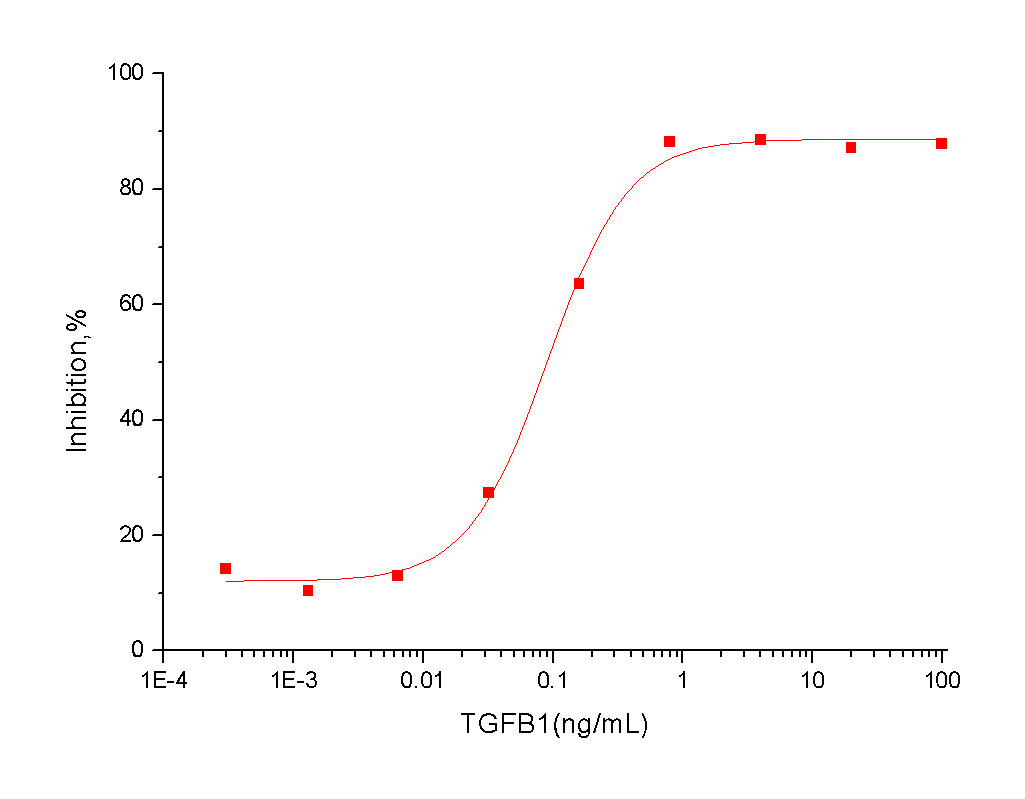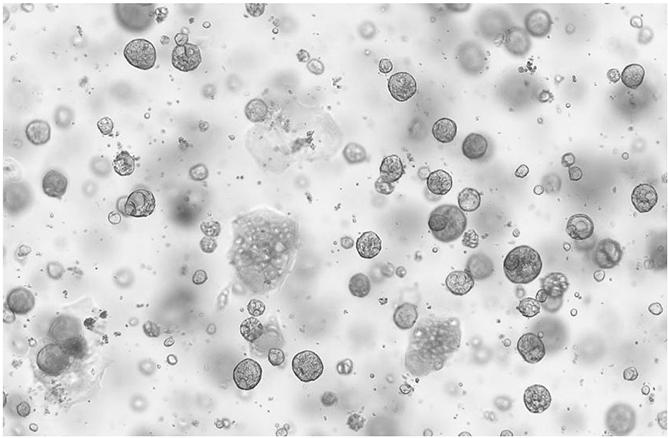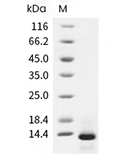Shopping Cart
- Remove All
 Your shopping cart is currently empty
Your shopping cart is currently empty

TGF beta 1 Protein, Human/Rhesus/Cynomolgus/Canine, Recombinant is expressed in CHO mammalian cells. The predicted molecular weight is 12.8 kDa and the accession number is A0A499FJK2.

| Pack Size | Price | Availability | Quantity |
|---|---|---|---|
| 20 μg | $197 | In Stock | |
| 100 μg | $498 | 7-10 days | |
| 200 μg | $830 | 7-10 days | |
| 500 μg | $1,630 | 7-10 days |
| Biological Activity | 1. Measured by its ability to inhibit cell proliferation of Mv-1-lu mink lung epithelial cells. The ED50 for this effect is typically 0.01-0.1 ng/mL. _x000D_ 2. Human liver cancer organoids were cultured with FGF2 (Cat#TMPY-00749), HGF (Cat#TMPY-02327), FGF7 (Cat#TMPY-00403), EGF (Cat#TMPY-03701), FGF10 (Cat#TMPY-01061), TGFB1 (Cat#TMPY-02638), NOG (Cat#TMPY-02594), RSPO1 (Cat#TMPY-03626).   |
| Description | TGF beta 1 Protein, Human/Rhesus/Cynomolgus/Canine, Recombinant is expressed in CHO mammalian cells. The predicted molecular weight is 12.8 kDa and the accession number is A0A499FJK2. |
| Species | Human,Rhesus,Cynomolgus,Canine |
| Expression System | CHO Cells |
| Tag | Tag Free |
| Accession Number | P01137 |
| Synonyms | transforming growth factor, β1,transforming growth factor, beta 1,TGF β1 |
| Construction | A DNA sequence encoding the active form of human / rhesus / cynomolgus / canine TGFβ1 (NP_000651.3) (Ala 279-Ser 390) was expressed and purified. Human, Rhesus, cynomolgus and Canine TGFβ1 sequences are identical. Predicted N terminal: Ala 279 |
| Protein Purity | > 95 % as determined by SDS-PAGE.  |
| Molecular Weight | 12.8 kDa (predicted); 13 & 26 kDa (non-reducing conditions) |
| Endotoxin | < 1.0 EU/μg of the protein as determined by the LAL method. |
| Formulation | Lyophilized from a solution filtered through a 0.22 μm filter, containing 100 mM GLY, 10 mM NaCl, pH 3. 0.Typically, a mixture containing 5% to 8% trehalose, mannitol, and 0.01% Tween 80 is incorporated as a protective agent before lyophilization. |
| Reconstitution | A Certificate of Analysis (CoA) containing reconstitution instructions is included with the products. Please refer to the CoA for detailed information. |
| Stability & Storage | It is recommended to store recombinant proteins at -20°C to -80°C for future use. Lyophilized powders can be stably stored for over 12 months, while liquid products can be stored for 6-12 months at -80°C. For reconstituted protein solutions, the solution can be stored at -20°C to -80°C for at least 3 months. Please avoid multiple freeze-thaw cycles and store products in aliquots. |
| Shipping | In general, Lyophilized powders are shipping with blue ice. |
| Research Background | TGF-beta 1 is a member of the transforming growth factor beta (TGF-beta) family. The transforming growth factor-beta family of polypeptides are involved in the regulation of cellular processes, including cell division, differentiation, motility, adhesion and death. TGF-beta 1 positively and negatively regulates many other growth factors. It inhibits the secretion and activity of many other cytokines including interferon-γ, tumor necrosis factor-alpha and various interleukins. It can also decrease the expression levels of cytokine receptors. Meanwhile, TGF-beta 1 also increases the expression of certain cytokines in T cells and promotes their proliferation, particularly if the cells are immature. TGF-beta 1 also inhibits proliferation and stimulates apoptosis of B cells, and plays a role in controlling the expression of antibody, transferrin and MHC class II proteins on immature and mature B cells. As for myeloid cells, TGF-beta 1can inhibit their proliferation and prevent their production of reactive oxygen and nitrogen intermediates. However, as with other cell types, TGF-beta 1 also has the opposite effect on cells of myeloid origin. TGF-beta 1 is a multifunctional protein that controls proliferation, differentiation and other functions in many cell types. It plays an important role in bone remodeling as it is a potent stimulator of osteoblastic bone formation, causing chemotaxis, proliferation and differentiation in committed osteoblasts. Once cells lose their sensitivity to TGF-beta1-mediated growth inhibition, autocrine TGF-beta signaling can promote tumorigenesis. Elevated levels of TGF-beta1 are often observed in advanced carcinomas, and have been correlated with increased tumor invasiveness and disease progression.Cancer ImmunotherapyImmune CheckpointImmunotherapyTargeted Therapy |

Copyright © 2015-2025 TargetMol Chemicals Inc. All Rights Reserved.